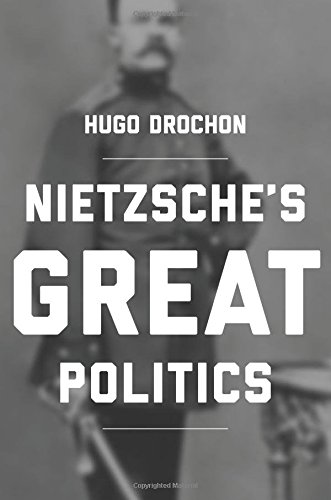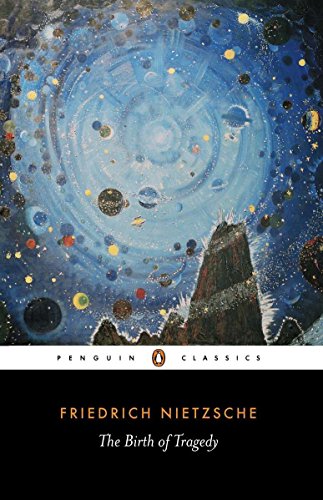Nietzsche’s Great Politics. By Hugo Drochon. Princeton University Press, 2016. xv + 200 pages.
In the nineteenth century, most classical liberals believed that the state had to provide protective services. Gustave de Molinari disagreed; in The Production of Security (1849), he argued that private companies could provide these services. But few joined him in denying that what Lassalle derided as a “night watchman state” was necessary; and even Molinari in his later years retreated from his earlier radicalism on this issue.1
Hugo Drochon, a distinguished intellectual historian at Cambridge University, has in this brilliant new book pointed to another thinker who believed private protection agencies were possible. This is none other than Friedrich Nietzsche. “In an important aphorism in Human, All Too Human, titled ‘Religion and Government,’ he writes that ‘a later generation will also see the state shrink to insignificance on various parts of the earth.’… Nietzsche concludes by proclaiming ‘with certainty’ that ‘distrust of all government’ … will ‘impel men to a quite novel resolve: the resolve to do away with the concept of the state, to abolish the distinction between public and private.’ Instead, an ‘invention more suited to their purpose than the state was will gain victory over the state.’ ‘Private companies’ (Privatgesellschaften) will ‘step by step absorb the business of the state,’ including activities that are the ‘most resistant remainder of what was formerly the work of the government’: protecting ‘the private person from the private person.’” (pp. 62–63)2
Current Prices on popular forms of Silver Bullion
This is not the only point at which Nietzsche’s thought leaned in a libertarian direction. In a manner that brings to mind Lysander Spooner, he scorned rule by an alleged majority as a justification for the state: “In ‘The Right of Universal Suffrage,’ he explains that ‘a law that decrees that the majority shall have the decisive voice in determining the well-being of all cannot be erected on a foundation that is first provided by that law itself.’ … Democracy never founds itself, and continual nonparticipation implies a rejection of the regime as a whole.” (p. 77)
 Nietzsche’s Grea...
Best Price: $17.19
Buy New $27.25
(as of 03:50 UTC - Details)
Nietzsche’s Grea...
Best Price: $17.19
Buy New $27.25
(as of 03:50 UTC - Details)
Like Franz Oppenheimer and Albert Jay Nock, Nietzsche held that the state rests on conquest: “I used the word ‘state’; it is obvious who is meant by this — some pack of blond beasts of prey, a conqueror and master race, which organized on a war footing, and with the power to organize, unscrupulously lays its dreadful paws on the populace, which though it might be vastly greater in number, is shapeless and shifting.” (p. 58)
One should not conclude from this that Nietzsche was a libertarian — far from it. He did not advance the conquest account of the state to condemn it but rather to justify it.3 For him the creation of genius stood first and foremost and, in the ancient world slavery played an essential role in this process. “The state, for Nietzsche, is justified because it opens up a space within which culture, through genius, can for the first time flourish.” (p. 56) Richard Wagner strongly dissented from this view; and, as a result, Nietzsche, then closely allied with Wagner, omitted from The Birth of Tragedy his justification for slavery.4
In his stress on the importance for Nietzsche of politics as the pursuit of culture, Drochon draws on John Rawls’s concept of perfectionism: “Rawls identifies two variants in his definition of political perfectionism. The first … holds that the sole principle of a teleological theory directing society [is] … to maximize the achievement of human excellence in art, science, and culture.’ … It is this highly demanding perfectionism that he attributes to Nietzsche, noting that ‘the absolute weight that Nietzsche sometimes gives the lives of great men such as Socrates and Goethe.’” (p. 127) Drochon holds, though, that Rawls has exaggerated; Nietzsche, contrary to Rawls’s portrayal, does not dismiss entirely the value of the spirit of the herd.5
Slavery in the ancient world was onerous, but in the contemporary world, prospects for the masses were better. They ought to be compelled to provide resources for the cultured elite but otherwise could be left to their own devices.
 The Production of Secu...
Best Price: $5.99
Buy New $4.95
(as of 07:55 UTC - Details)
The Production of Secu...
Best Price: $5.99
Buy New $4.95
(as of 07:55 UTC - Details)
For the Europe of his own time, Nietzsche was in politics far from an authoritarian. Although in his youth a supporter of Bismarck, he came in his later years to reject the militarist politics of the Iron Chancellor, whom he called “the idiot ‘par excellence’ who only fought wars in favor of the dynastic politics of the Hohenzollern, instead of aiming for ‘great missions, universal and historical goals of a supreme and refined intellect.’”
Contrary to Bertrand Russell, who called World War I “Nietzsche’s War,” the wars Nietzsche had in mind were wars of the intellect. Conventional power politics was financially burdensome and sapped the lives of young men who might otherwise have contributed to culture: “[The] sum of all these sacrifices of individual energy and labor is so enormous that almost necessarily, the political flowering of a people is followed by an intellectual impoverishment and exhaustion, a decreased ability to produce works that demand great concentration and single-mindedness.” (p. 157)
Instead of the power politics of Bismarck and Kaiser Wilhelm II, Nietzsche proposed a “great politics” of his own, a union of the forces of life and culture throughout Europe that would aim to produce the “overman.” Drochon argues that in the years just before his mental collapse in 1889, Nietzsche planned a direct entrance into politics to advance his ambitious cultural aims: “Nietzsche’s great politics wants to breed a new, superior, type of man through a correct use of physiology.6 … For his party of life, Nietzsche calls for the formation of associations, so as to provide him ‘with a few million partisans,’ with ‘immortal,’ — in the sense that they can continue his work once he is gone — and ‘numerous’ hands to help him through on the ‘Revolution of All Values …”7 p. 168)
Drochon’s presentation of Nietzsche as a cultural elitist who views the state of his time as enemy brings to mind the libertarian elitism of H.L. Mencken, who, by no coincidence, wrote a book about Nietzsche’s philosophy. If Drochon’s account of Nietzsche’s politics is right, Mencken was a faithful Nietzschean in his politics.
 The Birth of Tragedy: ...
Best Price: $1.99
Buy New $7.16
(as of 05:30 UTC - Details)
The Birth of Tragedy: ...
Best Price: $1.99
Buy New $7.16
(as of 05:30 UTC - Details)
Notes:
- 1.Left anarchists of course reject state protective services, but they do not propose to replace the state with private protection agencies.
- 2.It might be worth investigating whether Nietzsche was here influenced by the anarchist Max Stirner’s “unions of egoists.” As George J. Stack notes in Lange and Nietzsche, Nietzsche was thoroughly familiar with Lange’s History of Materialism, which discusses Stirner.
- 3.He is not here inconsistent with his criticism of democracy, because his attack on the justification for democracy is that it fails by its own criterion. The conquest theory suffers from no such infirmity.
- 4.Wagner had been in his youth a political radical. George Bernard Shaw in The Perfect Wagnerite famously interpreted Wagner’s Ring as a defense of socialism.
- 5.Rawls, by the way, compiled the index for Walter Kaufmann’s Nietzsche: Philosopher, Psychologist, Antichrist.
- 6.Drochon notes that some of the eugenic measures Nietzsche supported were also favored by Margaret Mead. (p. 170) One might add that John Stuart Mill favored licensing for parents, a matter for which he was roundly condemned by Frederic Harrison.
- 7.Drochon points out that in a letter to the great Danish critic Georg Brandes, Nietzsche stressed the importance of Jewish bankers for his project. (p. 168). It is interesting to note that Brandes was himself Jewish.
Note: The views expressed on Mises.org are not necessarily those of the Mises Institute.





